Charles E W Bean, Diaries, AWM38 3DRL 606/253/1 - 1918 - 1939 - Part 2
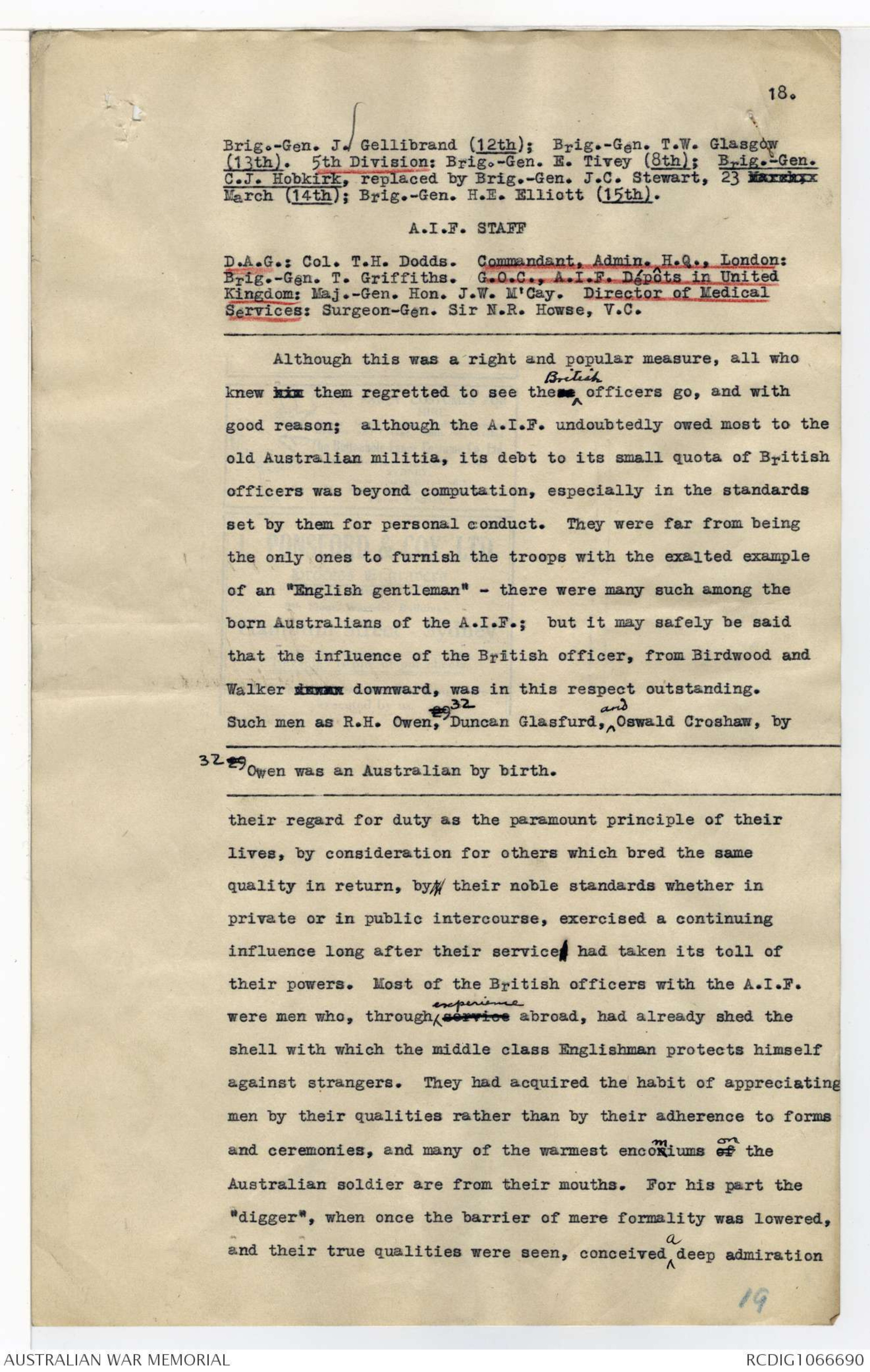
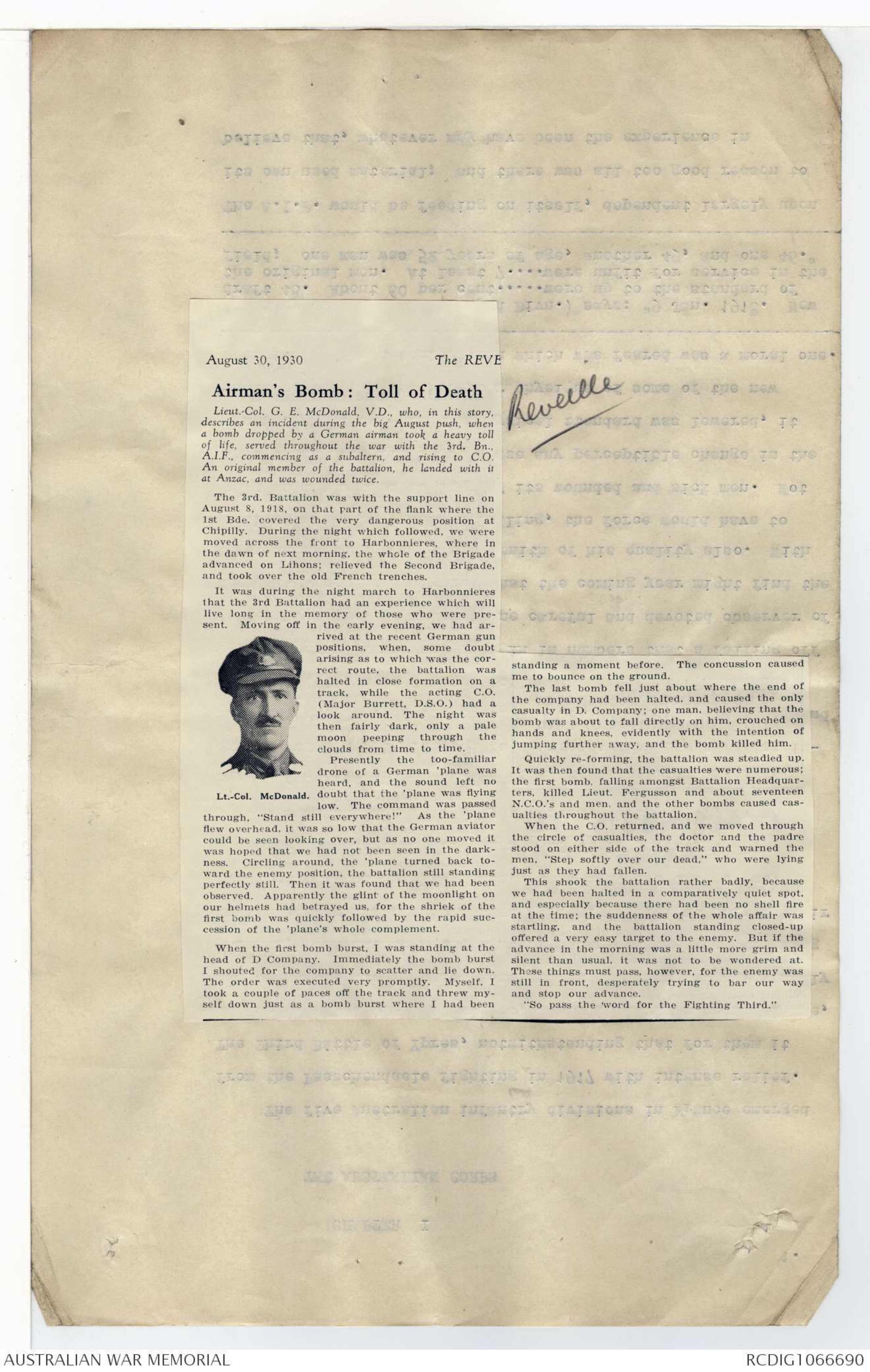
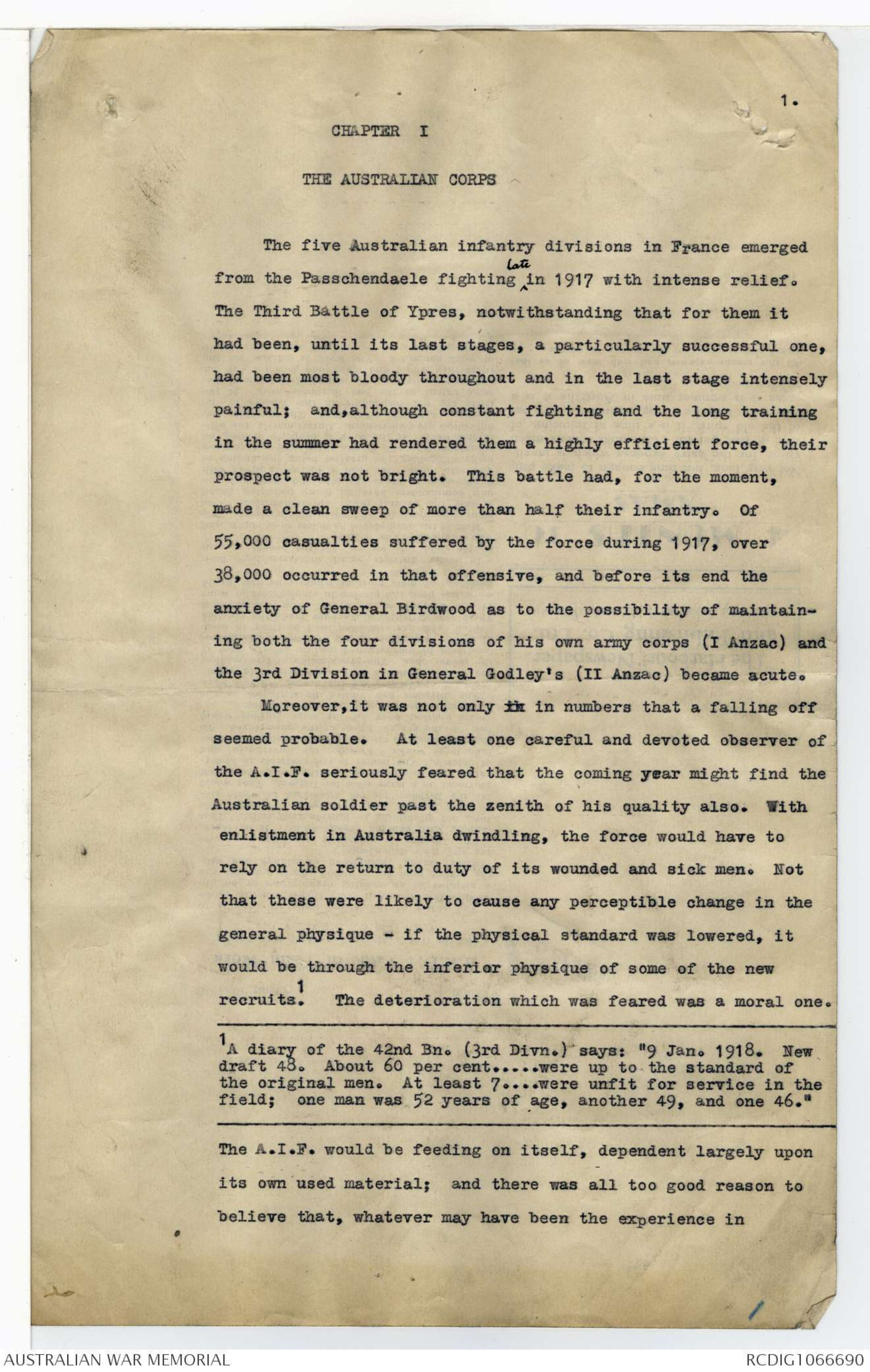
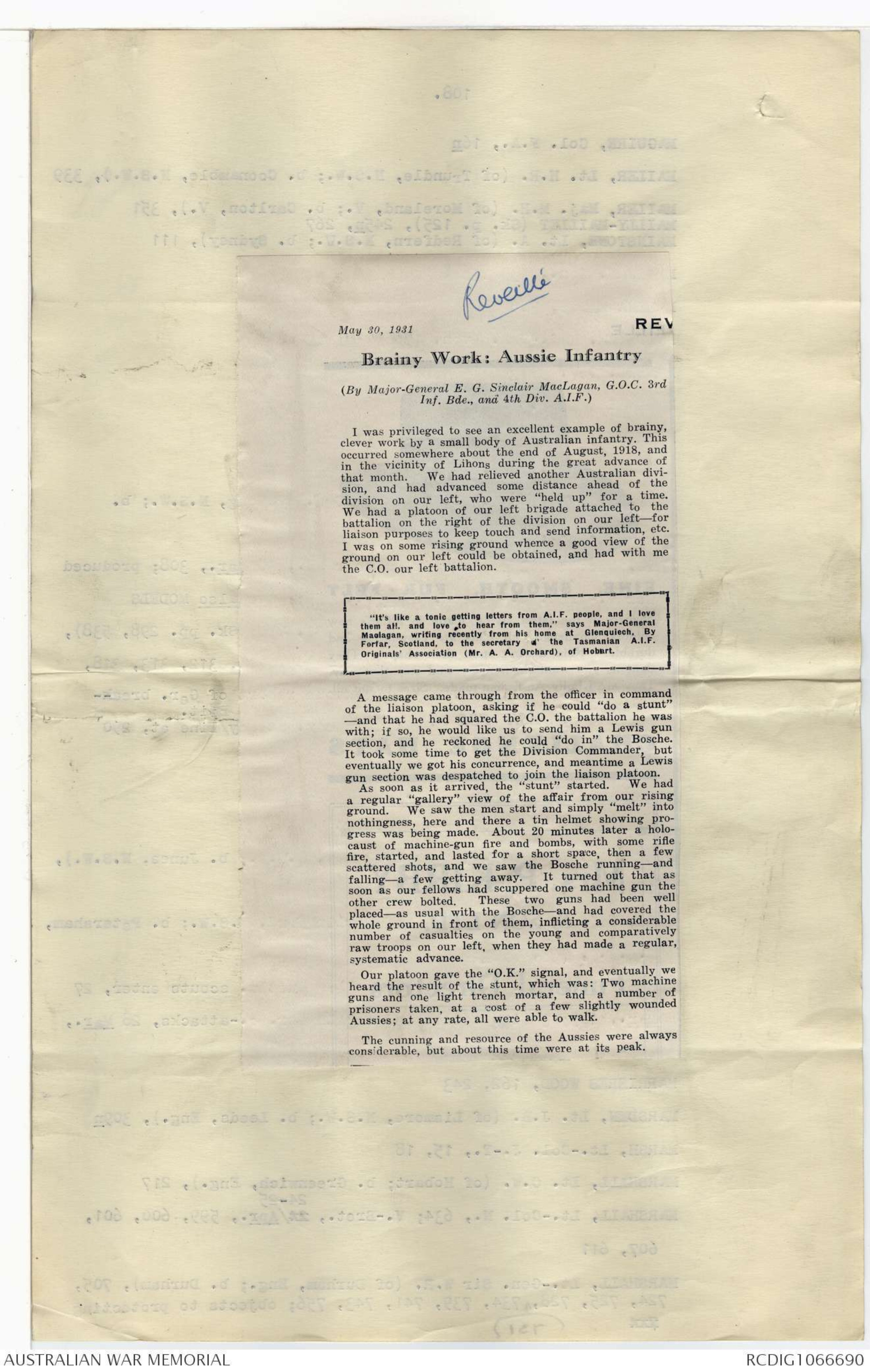
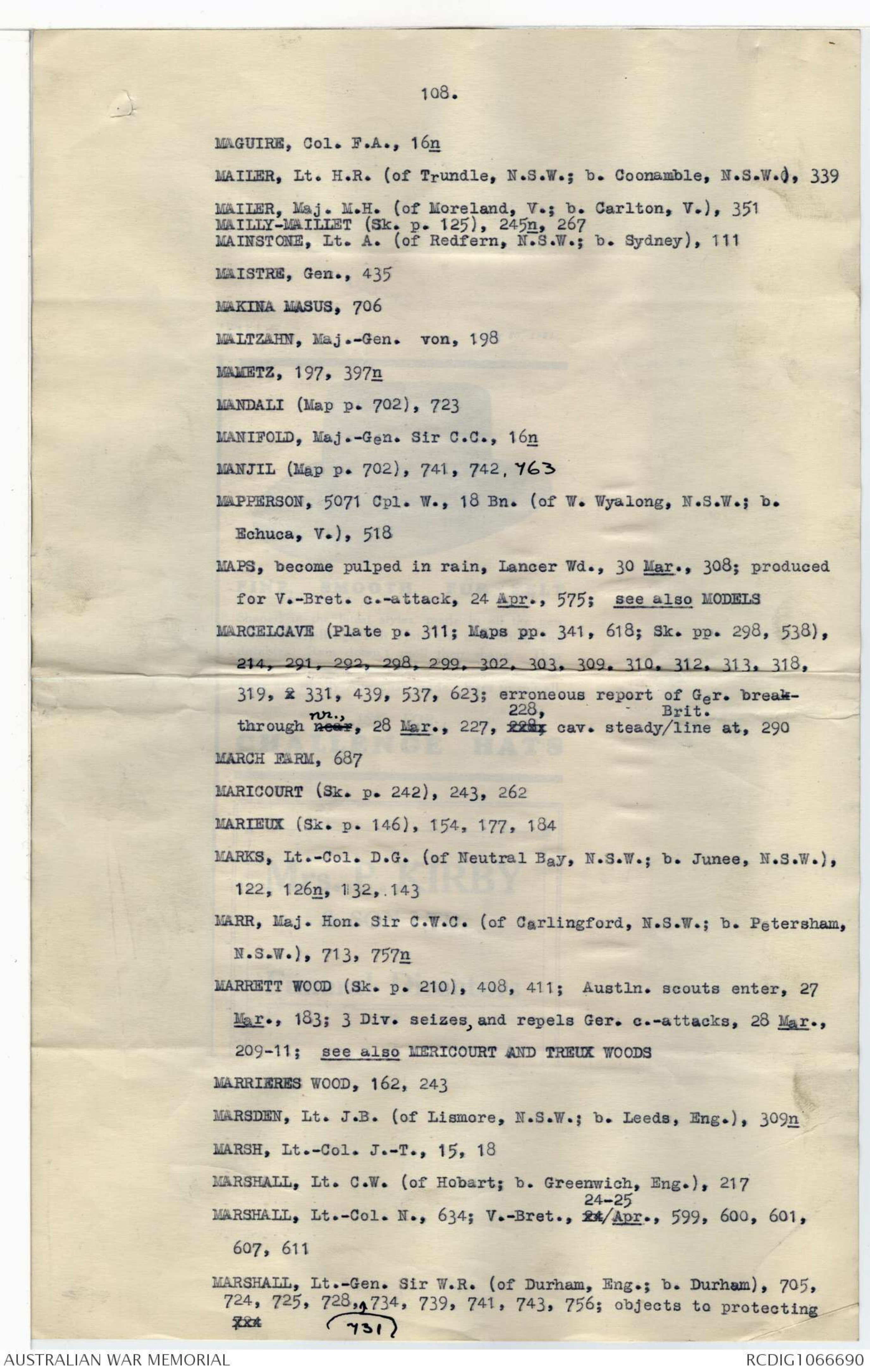
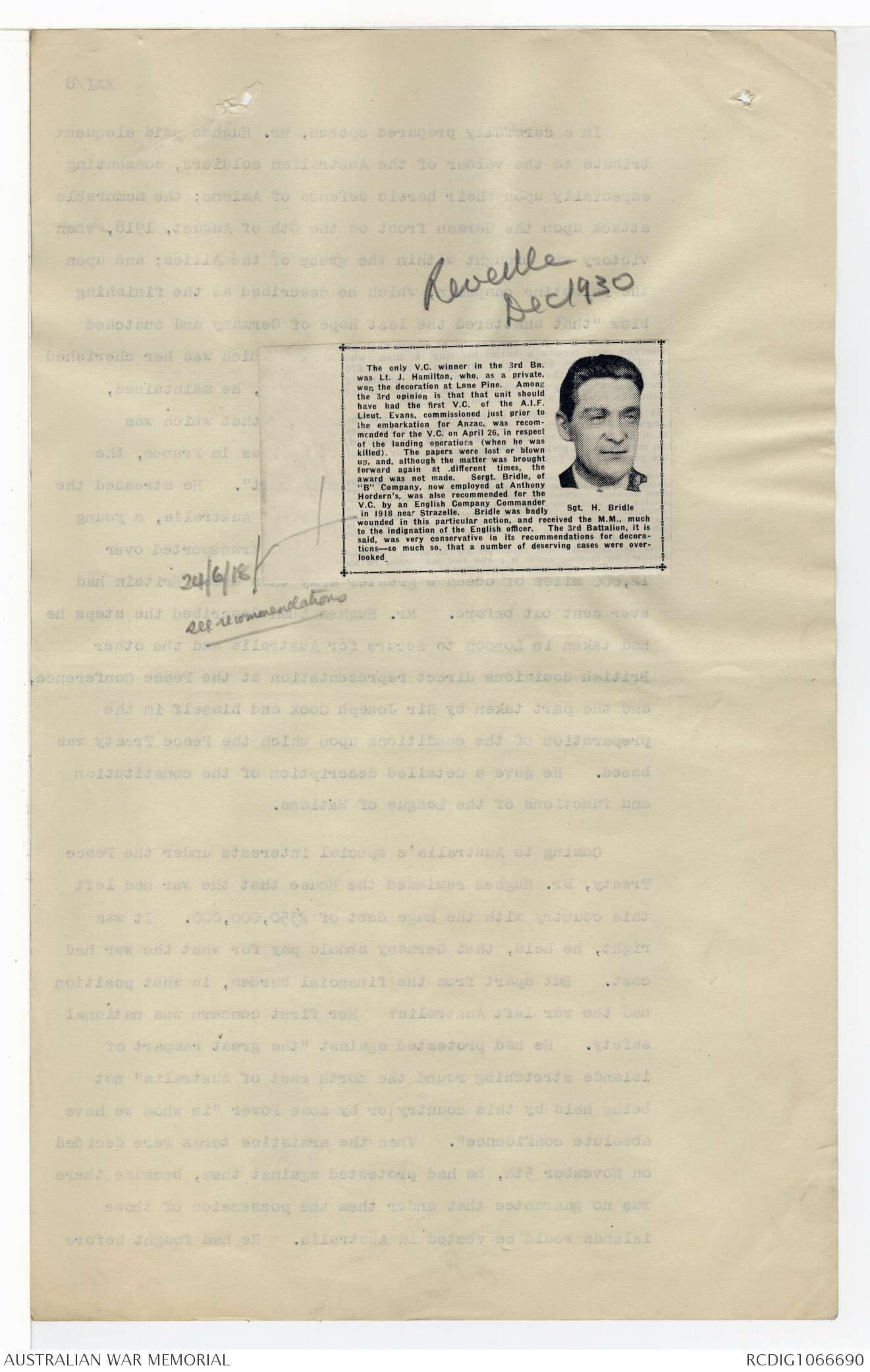
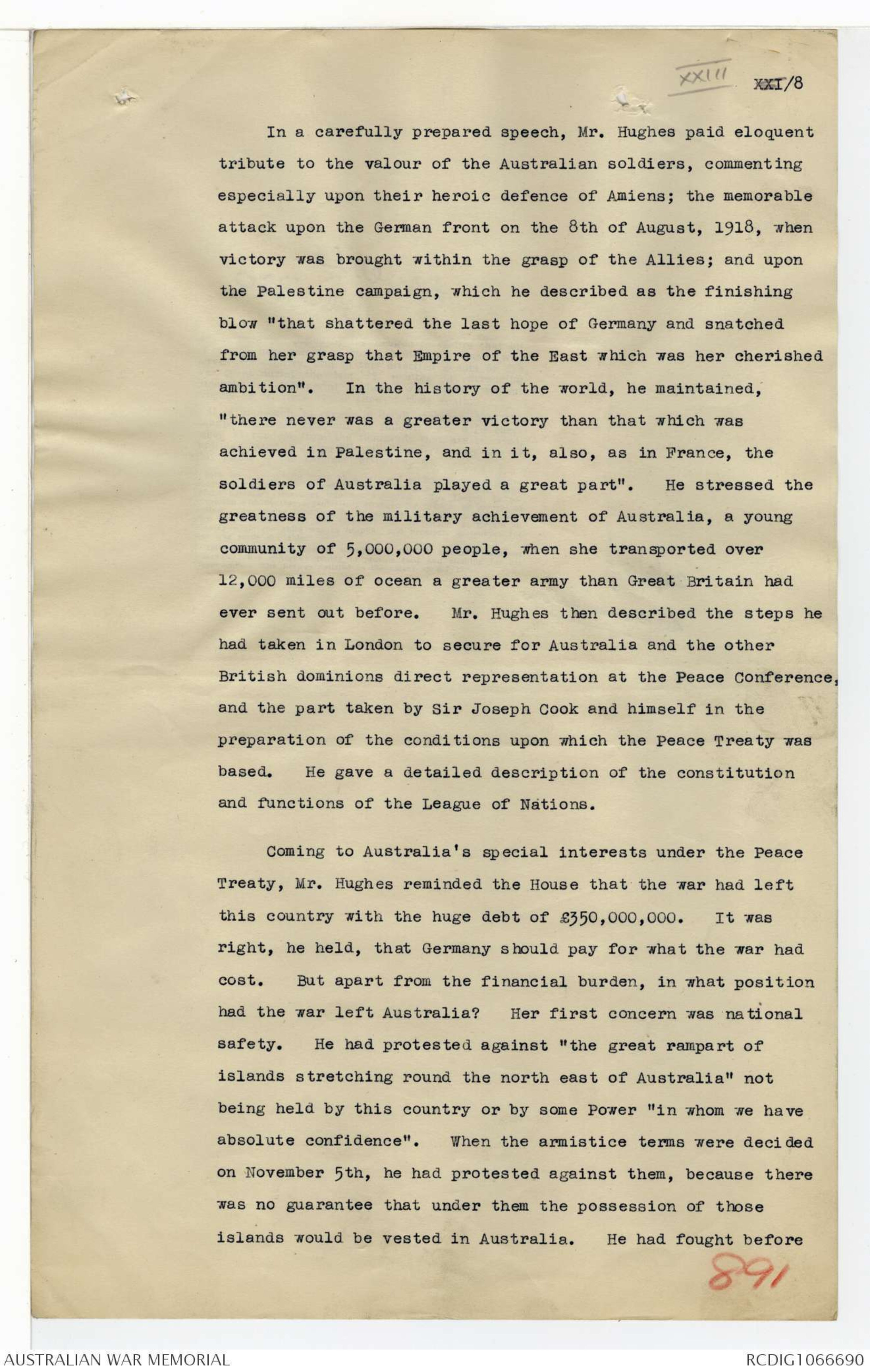
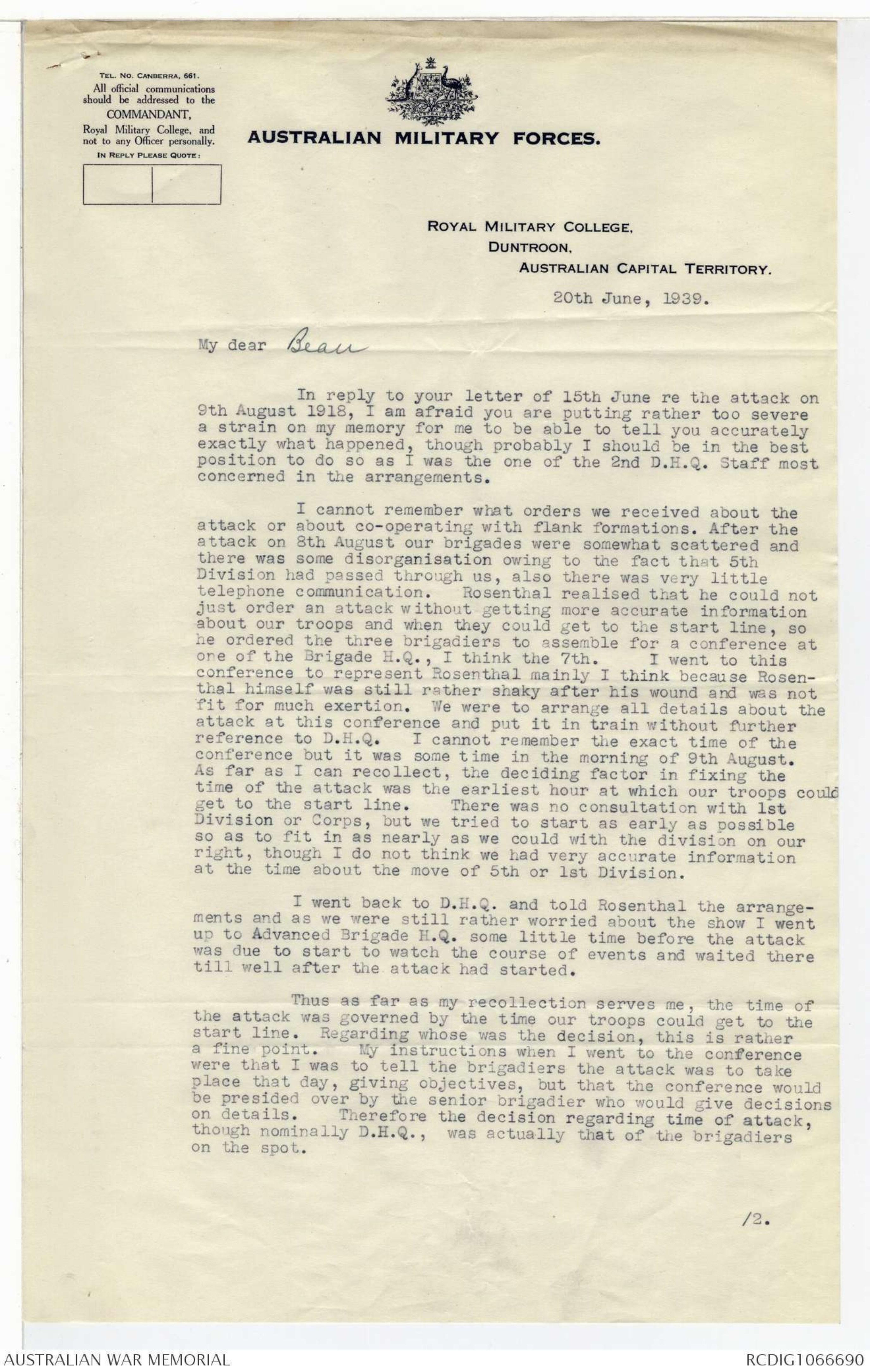
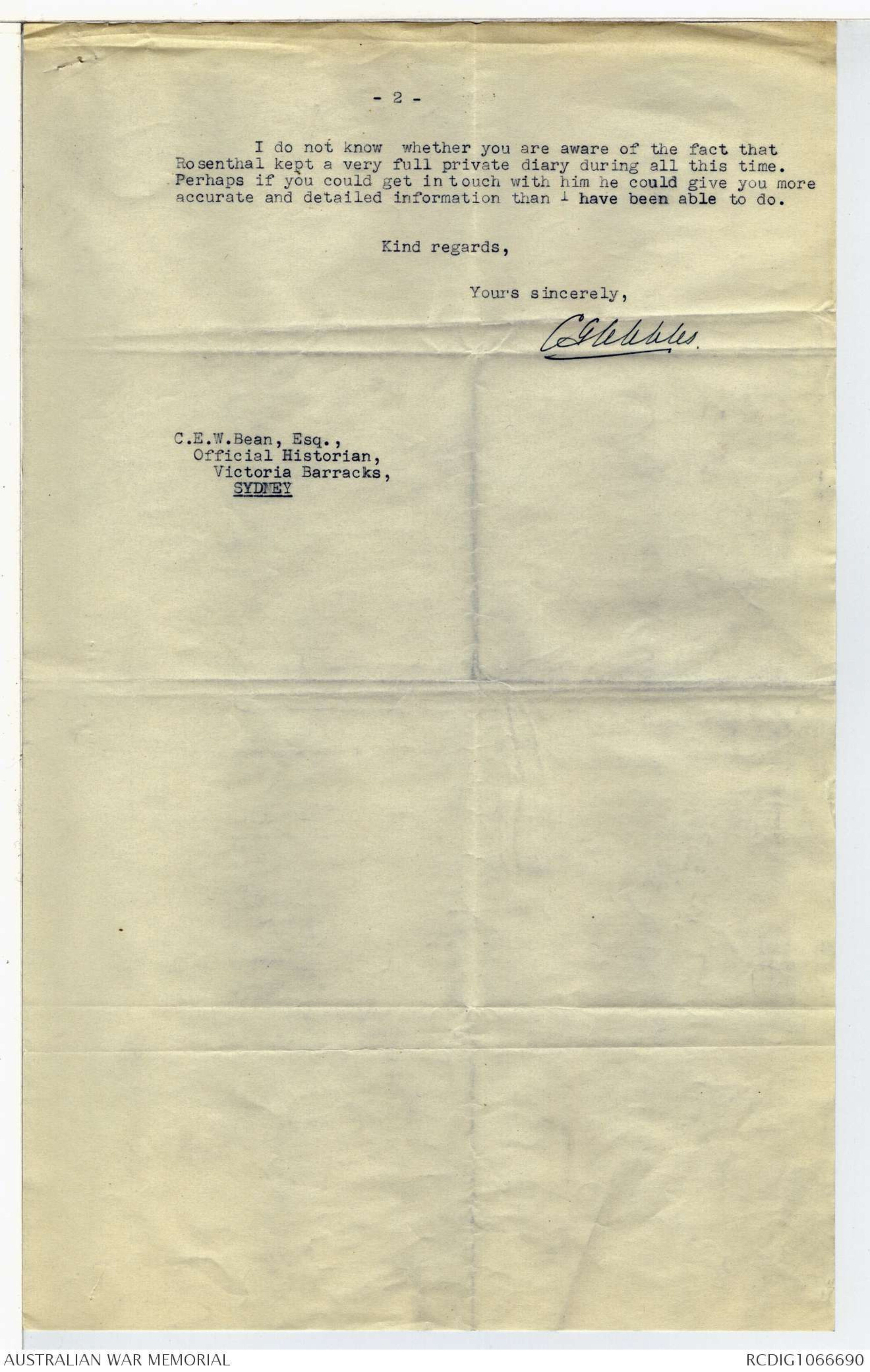
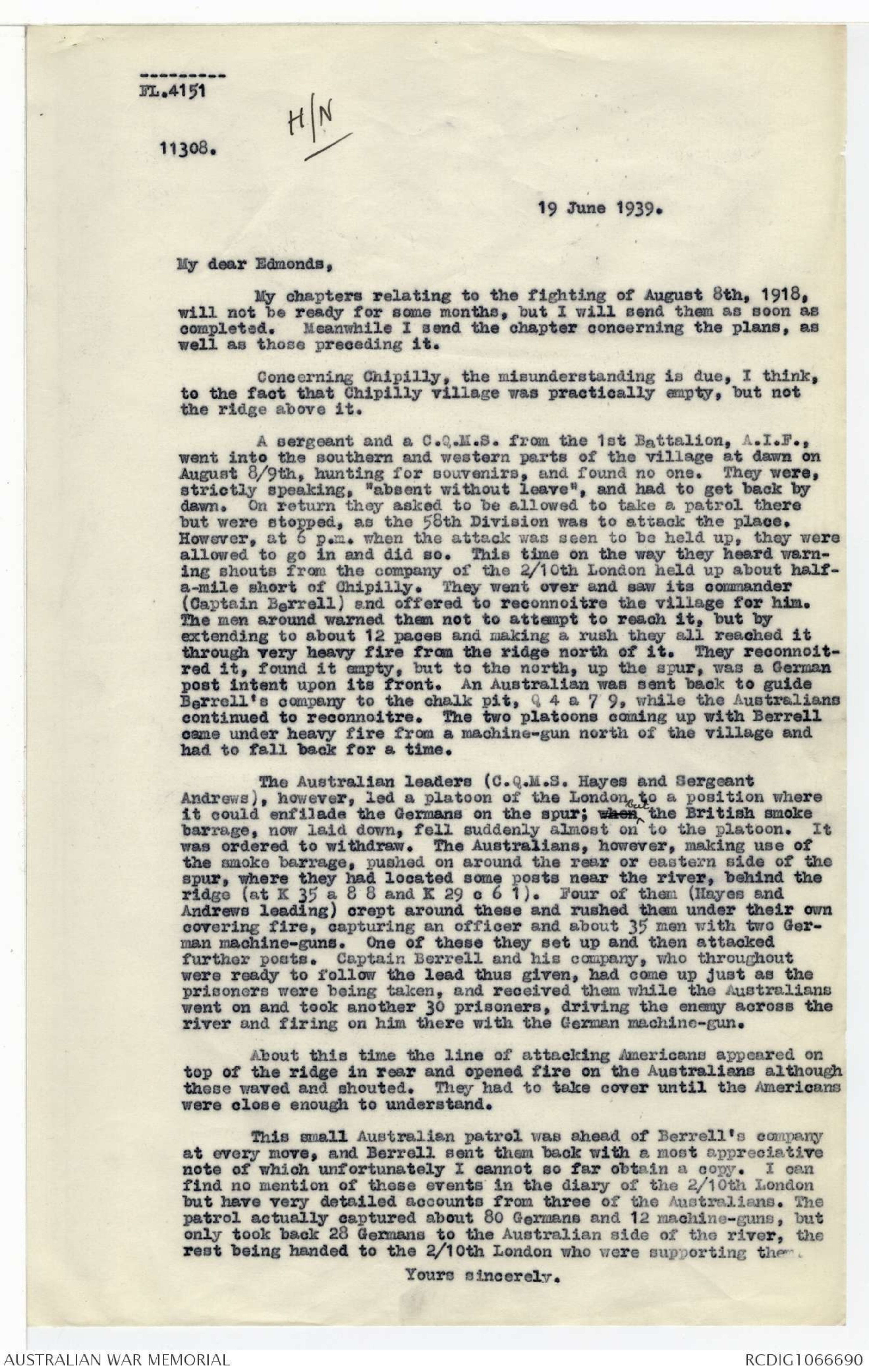
18.
Brig.-Gen. J. Gellibrand (12th); Brig.-Gen. T.W. Glasgow
(13th). 5th Division: Brig.-Gen. E. Tivey (8th); Brig.-Gen.
C.J. Hobkirk, replaced by Brig.-Gen. J.C. Stewart, 23 March
March (14th); Brig.-Gen. H.E. Elliott (15th).
A.I.F. STAFF
D.A.G. : Col. T.H. Dodds. Commandant, Admin. H.Q., London:
Brig.-Gen. T. Griffiths. G.O.C., A.I.F. Dépôts in United
Kingdom: Maj.-Gen. Hon. J.W. M'Cay. Director of Medical
Services: Surgeon-Gen. Sir N.R. Howse, V.C.
__________________________________________________
Although this was a right and popular measure, all who
knew him them regretted to see these ∧ British officers go, and with
good reason; although the A.I.F. undoubtedly owed most to the
old Australian militia, its debt to its small quota of British
officers was beyond computation, especially in the standards
set by them for personal conduct. They were far from being
the only ones to furnish the troops with the exalted example
of an "English gentleman" - there were many such among the
born Australians of the A.I.F; but it may safely be said
that the influence of the British officer, from Birdwood and
Walker xxxxx downward, was in this respect outstanding.
Such men as R.H. Owen,29 32 Duncan Glasfurd, ∧ and Oswald Crowshaw, by
______________________________________________________________
32 29Owen was an Australian by birth.
________________________________________________________________
their regard for duty as the paramount principle of their
lives, by consideration for others which bred the same
quality in return, byt their noble standards whether in
private or public intercourse, exercised a continuing
influence long after the services had taken its toll of
their powers. Most of the British officers with the A.I.F.
were men who, through service ∧ experience abroad, had already shed the
shell with which the middle class Englishman protects himself
against strangers. They had acquired the habit of appreciating
men by their qualities rather than by their adherence to forms
and ceremonies, and many of the warmest enconmiums of on the
Australian soldier are from their mouths. For his part the
"digger", when once the barrier of mere formality was lowered,
and their true qualities were seen, conceived, ∧ a deep admiration
19
August 30, 1930 The REVE
Airman’s Bomb: Toll of Death. [*Reveille*]
Lieut. -Col. G. E. McDonald, V.D., who, in this story,
describes an incident during the big August push, when
a bomb dropped by a German airman took a heavy toll
of life, served throughout the war with the 3rd. Bn.,
A.I.F., commencing as a subaltern, and rising to C.O.
An original member of the battalion, he landed with it
at Anzac, and was wounded twice.
Picture - see original document
Lt-Col. Mcdonald.
The 3rd Battalion was with the support line on
August 8, 1918, on that part of the flank where the
1st Bde. covered the very dangerous position at
Chipilly. During the night which followed, we were
moved across the front to Harbonnieres, where in
the dawn of next morning, the whole of the Brigade
advanced on Lihons; relieved the Second Brigade,
and took over the old French trenches.
It was during the night which march to Harbonnieres
that the 3rd Battalion had an experience which will
live long in the memory of those who were present.
Moving off in the early evening, we had arrived
at the recent German gun
positions, when, some doubt
arising as to which was the correct
route, the battalion was
halted in close formation on a
track, while the acting C.O.
(Major Burnett, D.S.O.) had a
look around. The night was
then fairly dark, only a pale
moon peeping through the
clouds from time to time.
Presently the too-familiar
drone of a German ‘plane was
heard, and the sound left no
doubt that the ‘plane was flying
low. The command was passed
through. “Stand still everywhere!” As the ‘plane
flew overhead, it was so low that the German aviator
could be seen looking over, but as no one moved it
was hoped that we had not been seen in the darkness.
Circling around, the ‘plane turned back toward
the enemy position, the battalion still standing
perfectly still. Then it was found that we had been
observed. Apparently the glint of the moonlight on
our helmets had betrayed us, for the shriek of the
first bomb was quickly followed by the rapid succession
of the ‘plane’s whole complement.
When the first bomb burst, I was standing at the
head of D Company. Immediately the bomb burst
I shouted for the company to scatter and lie down.
The order was executed very promptly. Myself, I
took a couple of paces off the track and threw myself
down just as a bomb burst where I had been
standing a moment before. The concussion caused
me to bounce on the ground.
The last bomb fell just about where the end of
the company had been halted, and caused the only
casualty in D. Company; one man, believing that the
bomb was about to fall directly on him, crouched on
hands and knees, evidently with the intention of
jumping further away, and the bomb killed him.
Quickly re-forming, the Battalion was steadied up.
It was then found that the casualties were numerous;
the first bomb, falling amongst Battalion Headquarters,
killed Lieut. Fergusson and about seventeen
N.C.O.‘s and men, and the other bombs caused casualties
throughout the battalion.
When the C.O. returned, and we moved through
the circle of casualties, the doctor and the padre
stood on either side of the track and warned the
men “Step softly over our dead,” who were lying
just as they had fallen.
This shook the battalion rather badly, because
we had been halted in a comparatively quiet spot,
and especially because there had been no shell fire
at the time; the suddenness of the whole affair was
startling, and the battalion standing closed-up
offered a very eager target to the enemy. But if the
advance in the morning was a little more grim and
silent than usual, it was not to be wondered at.
These things must pass, however, for the enemy was
still in front, desperately trying to bar our way
and stop our advance.
“So pass the word for the Fighting Third."
1.
CHAPTER I
THE AUSTRALIAN CORPS
The five infantry divisions in France emerged
from the Passchendaele fighting ∧ late in 1917 with intense relief.
The Third Battle of Ypres, notwithstanding that for them it
had been, until its last stages, a particularly successful one,
had been most bloody throughout and in the last stage intensely
painful; and, although constant fighting and the long training
in the summer had rendered them a highly efficient force, their
prospect was not bright. This battle had, for the moment,
made a clean sweep of more than half their infantry. Of
55,000 casualties suffered by the force during 1917, over
38,000 occurred in that offensive, and before its end the
anxiety of General Birdwood as to the possibility of maintaining
both the four divisions of his own army corps (I Anzac) and
the 3rd Division in General Godley's (II Anzac) became acute.
Moreover, it was not only ih in numbers that a falling off
seemed probable. At least one careful and devoted observer of
the A.I.F. seriously feared that the coming year might find the
Australian soldier past the zenith of his quality also. With
enlistment in Australia dwindling, the force would have to
rely on the return to duty of its wounded and sick men. Not
that these were likely to cause any perceptible change in the
general physique - if the physical standard was lowered, it
would be through inferior physique of some of the new
recruits. 1 The deterioration which was feared was a moral one.
____________________________________________________________
1 A diary of the 42nd. Bn. (3rd Divn.) says: "9 Jan. 1918. New
draft 48. About 60 per cent .....were up to the standard of
the original men. At least 7.....were unfit for service in the
field; one man was 52 years of age, another 49, and one 46."
______________________________________________________________
The A.I.F. would be feeding on itself, dependent largely upon
its own used material; and there was all too good reason to
believe that, whatever may have been the experience in
[*Reveille*]
May 30, 1931 REV
Brainy Work: Aussie Infantry
(By Major-General E. G. Sinclair MacLagan, G.O.C. 3rd
Inf. Bde., and 4th Div. A.I.F.)
I was privileged to see an excellent example of brainy,
clever work by a small body of Australian Infantry. This
occurred somewhere about the end of August, 1918, and
in the vicinity of Lihons during the great advance of
that month. We had relieved another Australian division,
and had advanced some distance ahead of the
division on our left, who were “held up” for a time.
We had a platoon of our left brigade attached to the
battalion on the right of the division on our left--for
liaison purposes to keep touch and send information, etc.
I was on some rising ground whence a good view of the ground
on our left could be obtained, and had with me
the C.O. our left battalion.
_________________________________________________________
”It’s like a tonic getting letters from A.I.F. people, and I love
them all, and love to hear from them.” says Major-General
Maclagan, writing recently from his home at Glenquiech, By
Forfar, Scotland, to the secretary of the Tasmanian A.I.F.
Originals’ Association (Mr A. A. Orchard), of Hobart.
__________________________________________________________
A message came through from the officer in command
of the liaison platoon, asking if he could “do a stunt”
-and that he had squared the C.O. the battalion he was
with; if so, he would like us to send him a Lewis gun
section, and he reckoned he could “do in” the Bosche.
It took some time to get the Division Commander, but
eventually we got his concurrence, and meantime a Lewis
gun section was despatched to join the liaison platoon.
As soon as it arrived, the “stunt” started. We had
a regular “gallery” view of the affair from our rising
ground. We saw the men start and simply “melt” into
nothingness, here and there a tin helmet showing
progress was being made. About 20 minutes later a
holocaust of machine-gun fire and bombs, with some rifle
fire, started, and lasted for a short space, then a few
scattered shots, and we saw the Bosche running-and
falling-a few getting away. It turned out that as
soon as our fellows had scuppered one machine gun the
other crew bolted. These two guns had been well
placed-as usual with the Bosche-and had covered the
whole ground in front of them, inflicting a considerable
number of casualties on the young and comparatively
raw troops on our left, when they had made a regular,
systematic advance.
Our platoon gave the “O.K.” signal, and eventually we
heard the result of the stunt, which was : Two machine
Guns and one light trench mortar, and a number of
prisoners taken, at a cost of a few slightly wounded
Aussies; at any rate; all were able to walk.
The cunning and resource of the Aussies were always
considerable, but about this time were at its peak.
108.
MAGUIRE, Col. F.A., 16n
MAILER, Lt. H.R. (of Trundle, N.S.W.; b. Coonamble, N.S.W.), 339
MAILER, Maj. M.H. (of Moreland, V.; b. Carlton, V.), 351
MAILLEY-MAILLET (Sk. p. 125), 245n, 267
MAINSTONE, LT. a. (of Redfern, N.S.W.; b. Sydney), 111
MAISTRE, Gen., 435
MAKINA MASUS, 706
MALTZAHN, Maj. -Gen. von, 198
MAMETZ, 197, 397n
MANDALI (Map. p. 702), 723
MANIFOLD, Maj.-Gen. Sir C.C. 16n
MANJIL (Map P. 702), 741, 742, 763
MAPPERSON, 5071 Cpl. W., 18 Bn (of W. Wyalong, N.S.W.; b.
Echuca, V.), 518
MAPS, become pulped in rain, Lancer Wd., 30 Mar., 308; produced
for V. -Bret. c.-attack, 24 Apr., 575; see also MODELS
MARCELCAVE (Plate p. 311; Maps pp. 341, 618; Sk. pp. 298, 538),
214, 291, 292, 298, 299, 302, 303, 309, 310, 312, 313, 318,
319, 2 331, 439, 537, 623; erroneous report of Ger. breakthroughnear, 28 Mar., 227, 229 228, cav. steady/Brit. line at, 290
MARCH FARM, 687
MARICOURT (Sk. p. 242), 243, 262
MARIEUX (Sk. p. 146), 154, 177, 184
MARKS, Lt. -Col. D.G. (of Neutral Bay, N.S.W.; b. Junee, N.S.W.),
122, 126n, 132, 143
MARR, Maj. Hon. Sir C.W.C. (of Carlingford, N.S.W. b. Petersham,
N.S.W.), 713, 757n
MARRETT WOOD (Sk. p. 210), 408, 411; Austln. scouts enter, 27
Mar., 183; 3 Div. seizes, and repels Ger. c.-attacks, 28 Mar.,
209-211' see also MERICOURT AND TREUX WOODS
MARRIERES WOOD, 162, 243
MARSDEN, Lt. J.B. (of Lismore, N.S.W; b. Leeds, Eng.), 309n
MARSH, Lt.-Col. J.-T., 15, 18
MARSHALL, Lt. C.W, (of Hobart; b. Greenwich, Eng.), 217
MARSHALL, Lt.-Col. N., 634; V.-Bret., 24/ 24-25 Apr., 599, 600, 601,
607, 611
MARSHALL, Lt,-Gen. Sir W.R. (of Durham, Eng.; b. Durham), 705,
724, 725, 728, ∧731, 734, 739, 741, 743, 756; objects to protecting
724
[*Reveille
Dec 1930*]
Picture - see original document
Sgt. H. Bridle
The only V.C. winner in the 3rd Bn.
was Lt. J. Hamilton, who as a private,
won the decoration at Lone Pine. Among
the 3rd opinion is that that unit should
have had the first V.C. of the A.I.F.
Lieut. Evans commissioned just prior to
the embarkation for Anzac, was
recommended for the V.C. on April 26, in respect
of the landing operations (when he was
killed). The papers were lost or blown
up, and, although the matter was brought
forward again at different times, the
award was not made. Sergt. Bridle, of
"B" Company, now employed at Anthony
Horden's was also recommended for the
V.C. by an English Company Commander
in 1918 near Strazeele. Bridle was badly
wounded in this particular action, and received the M.M., much
to the indignation of the English officer. The 3rd Battalion, it is
said, was very conservative in its recommendations for
decorations-so much so, that a number of deserving cases were
overlooked.
[*24/6/18
see recommendations*]
XXIII XXX/8
In a carefully prepared speech, Mr. Hughes paid eloquent
tribute to the valour of the Australian soldiers, commenting
especially upon their heroic defence of Amiens; the memorable
attack upon the German front on the 8th of August, 1918, when
victory was brought within the grasp of the Allies; and upon
the Palestine campaign, which he described as the finishing
blow "that shattered the last hope of Germany and snatched
from her grasp that Empire of the East which was her cherished
ambition". In the history of the world, he maintained,
"there never was a greater victory than that which was
achieved in Palestine, and in it, also, as in France, the
soldiers of Australia played a great part". He stressed the
greatness of the military achievement of Australia, a young
community of 5,000,000 people, when she transported over
12,000 miles of ocean a greater army than Great Britain had
ever sent out before. Mr. Hughes then described the steps
he had taken in London to secure for Australia and the other
British dominions direct representation at the Peace Conference,
and the part taken by Sir joseph Cook and himself in the
preparation of the conditions upon which the Peace Treaty was
based. He gave a detailed description of the constitution
and functions of the League of Nations.
Coming to Australia's special interests under the Peace
Treaty, Mr. Hughes reminded the House that the war had left
this country with the huge debt of £350,000,000. It was
right, he held, that Germany should pay for what the war had
cost. But apart from the financial burden, in what position
had the war left Australia? Her first concern was national
safety. He had protested against "the great rampart of
islands stretching round the north east of Australia" not
being held by this country or by some Power "in whom we have
absolute confidence". When the armistice terms were decided
on November 5th, he had protested against them, because there
was no guarantee that under them the possession of those
islands would be vested in Australia. He had fought before
891
TEL. NO. CANBERRA, 661.
All official communications
should be addressed to the
COMMANDANT,
Royal Military College, and
not to any Officer personally.
IN REPLY PLEASE QUOTE:
AUSTRALIAN MILITARY FORCES.
ROYAL MILITARY COLLEGE.
DUNTROON,
AUSTRALIAN CAPITAL TERRITORY.
20th June, 1939.
My dear Bean
In reply to your letter of 15th June re the attack on
9th August 1918, I am afraid you are putting rather too severe
a strain on my memory for me to be able to tell you accurately
exactly what happened, though probably I should be in the best
position to do so as I was the one of the 2nd D.H.Q. Staff most
concerned in the arrangements.
I cannot remember what orders we received about the
attack or about co-operating with flank formations. After the
attack on 8th August our brigades were somewhat scattered and
there was some disorganisation owing to the fact that 5th
Division had passed through us, also there was very little
telephone communication. Rosenthal realised that he could not
just order an attack without getting more accurate information
about our troops and when they could get to the start line, so
he ordered the three brigadiers to assemble for a conference at
one of the Brigade H.Q., I think the 7th. I went to this
conference to represent Rosenthal mainly I think because Rosenthal
himself was still rather shaky after his wound and was not
fit for much exertion. We were to arrange all details about the
attack at this conference and put it in train without further
reference to D.H.Q. I cannot remember the exact time of the
conference but it was some time in the morning of 9th August.
As far as I can recollect, the deciding factor in fixing the
time of the attack was the earliest hour at which our troops could
get to the start line. There was no consultation with 1st
Division or Corps, but we tried to start as early as possible
so as to fit in as nearly as we could with the division on our
right, though I do not think we had very accurate information
at the time about the move of 5th or 1st Division.
I went back to D.H.Q. and told Rosenthal the arrangements
and as we were still rather worried about the show I went
up to Advanced Brigade H.Q. some little time before the attack
was due to start to watch the course of events and waited there
till well after the attack had started.
Thus as far as my recollection serves me, the time
of the attack was governed by the time our troops could get to the
start line. Regarding whose was the decision, this is rather
a fine point. My instructions when I went to the conference
were that I was to tell the brigadiers the attack was to take
place that day, giving objectives, but that the conference would
be presided over by the senior brigadier who would give decisions
on details. Therefore the decision regarding time of attack,
though nominally D.H.Q., was actually that of the brigadiers
on the spot.
/2.
- 2 -
I do not know whether you are aware of the fact that
Rosenthal kept a very full private diary during all this time.
Perhaps if you could get in touch with him he could give you more
accurate and detailed information than I have been able to do.
Kind regards,
Yours sincerely,
CGN Miles
C.E.W.Bean, Esq.,
Official Historian,
Victoria Barracks,
SYDNEY
FL.4151
H/N
11308.
19 June 1939.
My dear Edmonds,
My chapters relating to the fighting of August 8th, 1918,
will not be ready for some months, but I will send them as soon as
completed. Meanwhile I send the chapter concerning the plans, as
well as those preceding it.
Concerning Chipilly, the misunderstanding is due, I think,
to the fact that Chipilly village was practically empty, but not
the ridge above it.
A sergeant and a C.Q.M.S. from the 1st Battalion, A.I.F.,
went into the southern and western parts of the village at dawn on
August 8/9th, hunting for souvenirs, and found no one. They were,
strictly speaking, "absent without leave", and had to get back by
dawn. On return they asked to be allowed to take a patrol there
but were stopped, as the 58th Division was to attack the place.
However, at 6 p.m. when the attack was seen to be held up, they were
allowed to go in and did so. This time on the way they heard warning
shouts from the company of the 2/10th London held up about half-a-mile
short of Chipilly. They went over and saw its commander
(Captain Berrell) and offered to reconnoitre the village for him.
The men around warned them not to attempt to reach it, but by
extending to about 12 paces and making a rush they all reached it
through very heavy fire from the ridge north of it. They reconnoitred
it, found it empty, but to the north, up the spur, was a German
post intent upon its front. An Australian was sent back to guide
Berrell's company to the chalk pit, Q 4 a 7 9, while the Australians
continued to reconnoitre. The two platoons coming up with Berrell
came under heavy fire from a machine-gun north of the village and
had to fall back for a time.
The Australian leaders (C.Q.M.S. Hayes and Sergeant
Andrews), however, led a platoon of the London to a position where
it could enfilade the Germans on the spur; when ∧ but the British smoke
barrage, now laid down, fell suddenly almost on to the platoon. It
was ordered to withdraw. The Australians, however, making use of
the smoke barrage, pushed on around the rear or eastern side of the
spur, where they had located some posts near the river, behind the
ridge (at K 35 a 8 8 and K 29 c 6 1). Four of them (Hayes and
Andrews leading) crept around these and rushed them under their own
covering fire, capturing an officer and about 35 men with two
German machine-guns. One of these they set up and then attacked
further posts. Captain Berrell and his company, who throughout
were ready to follow the lead thus given, had come up just as the
prisoners were being taken, and received them while the Australians
went on and took another 30 prisoners, driving the enemy across the
river and firing on him there with the German machine-gun.
About this time the line of attacking Americans appeared on
top of the ridge in rear and opened fire on the Australians although
these waved and shouted. They had to take cover until the Americans
were close enough to understand.
This small Australian patrol was ahead of Berrell's company
at every move, and Berrell sent them back with a most appreciative
note of which unfortunately I cannot so far obtain a copy. I can
find no mention of those events in the diary of the 2/10th London
but have very detailed accounts from three of the Australians. The
patrol actually captured about 80 Germans and 12 machine-guns, but
only took back 28 Germans to the Australian side of the river, the
rest being handed to the 2/10th London who were supporting them.
Yours sincerely.
 Sam scott
Sam scottThis transcription item is now locked to you for editing. To release the lock either Save your changes or Cancel.
This lock will be automatically released after 60 minutes of inactivity.